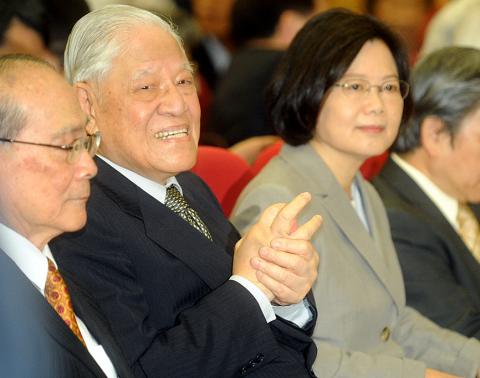Democratic Progressive Party (DPP) Chairperson Tsai Ing-wen (蔡英文) was noncommittal yesterday about constitutional reform, saying she would let the public fully discuss the issue and reach a consensus if she is elected president in January’s election.
Tsai, winner of the DPP’s recent three-way presidential primary, said it was important to deepen Taiwan’s democracy. To reach that goal, it was imperative to strengthen the governmental system, she added.
“I will let the public fully discuss the issue [of constitutional reform] if I’m elected,” she said on the sidelines of a forum held to mark the 20th anniversary of the abolition of the Temporary Provisions Effective During the Period of Communist Rebellion (動員戡亂時期臨時條款).

Photo: Wang Yi-sung, Taipei Times
“We will move on to the next stage if a consensus is reached. The most important thing is that the Taiwanese public must think about the issue, discuss it and come to a consensus,” she said.
Former president Lee Teng-hui (李登輝), who delivered the opening speech at the two-day forum hosted by Taiwan Advocates, the Taiwan Association of University Professors and three local think tanks yesterday, said the operation of the constitutional system in Taiwan was made possible after he nullified the temporary provisions in 1991.
The lifting of the temporary -provisions moved the country toward full elections for all legislative seats in 1992 and helped to bring about Taiwan’s first-ever direct elections for president in 1996.
The move also ended the civil war between the Chinese Nationalist Party (KMT) and Chinese Communist Party, he said.
“The direct presidential election in 1996 was a national referendum reflecting the free will of the Taiwanese people,” he said. “It is a serene revolution and it is not easy.”
Lee called on supporters to protect Taiwan’s democracy and reclaim power from the KMT in January’s presidential election, saying only solidarity would help reach the goal. He urged the public to have faith and that the goals of enacting a new constitution, rectifying the name of the country and becoming a normal country would eventually be realized.
Tsai, in her keynote speech, emphasized the importance of sustainable democracy.
Calling the annulment of the temporary provisions “a significant milestone of Taiwan’s development of democracy and national consciousness,” Tsai said it was ironic that President Ma Ying-jeou (馬英九) once vigorously opposed direct presidential elections, but he won the presidential poll in 2008.
The January elections are not only about the success or failure of individuals or competition between political parties, Tsai said, but about people having a say in the direction the nation takes and their expectations for democracy.
She proposed passing “sunshine laws,” to promote fair competition between political parties.
Government information must also be made more transparent, the referendum system made more reasonable and the thresholds for constitutional amendments lowered, she said.

FALSE DOCUMENTS? Actor William Liao said he was ‘voluntarily cooperating’ with police after a suspect was accused of helping to produce false medical certificates Police yesterday questioned at least six entertainers amid allegations of evasion of compulsory military service, with Lee Chuan (李銓), a member of boy band Choc7 (超克7), and actor Daniel Chen (陳大天) among those summoned. The New Taipei City District Prosecutors’ Office in January launched an investigation into a group that was allegedly helping men dodge compulsory military service using falsified medical documents. Actor Darren Wang (王大陸) has been accused of being one of the group’s clients. As the investigation expanded, investigators at New Taipei City’s Yonghe Precinct said that other entertainers commissioned the group to obtain false documents. The main suspect, a man surnamed

DEMOGRAPHICS: Robotics is the most promising answer to looming labor woes, the long-term care system and national contingency response, an official said Taiwan is to launch a five-year plan to boost the robotics industry in a bid to address labor shortages stemming from a declining and aging population, the Executive Yuan said yesterday. The government approved the initiative, dubbed the Smart Robotics Industry Promotion Plan, via executive order, senior officials told a post-Cabinet meeting news conference in Taipei. Taiwan’s population decline would strain the economy and the nation’s ability to care for vulnerable and elderly people, said Peter Hong (洪樂文), who heads the National Science and Technology Council’s (NSTC) Department of Engineering and Technologies. Projections show that the proportion of Taiwanese 65 or older would

The government is considering polices to increase rental subsidies for people living in social housing who get married and have children, Premier Cho Jung-tai (卓榮泰) said yesterday. During an interview with the Plain Law Movement (法律白話文) podcast, Cho said that housing prices cannot be brought down overnight without affecting banks and mortgages. Therefore, the government is focusing on providing more aid for young people by taking 3 to 5 percent of urban renewal projects and zone expropriations and using that land for social housing, he said. Single people living in social housing who get married and become parents could obtain 50 percent more

Democracies must remain united in the face of a shifting geopolitical landscape, former president Tsai Ing-wen (蔡英文) told the Copenhagen Democracy Summit on Tuesday, while emphasizing the importance of Taiwan’s security to the world. “Taiwan’s security is essential to regional stability and to defending democratic values amid mounting authoritarianism,” Tsai said at the annual forum in the Danish capital. Noting a “new geopolitical landscape” in which global trade and security face “uncertainty and unpredictability,” Tsai said that democracies must remain united and be more committed to building up resilience together in the face of challenges. Resilience “allows us to absorb shocks, adapt under